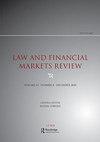Trade finance in Qatar: blockchain and economic diversification
Q2 Social Sciences
引用次数: 10
Abstract
Trade finance helps businesses deal with abnormal cash flows whilst managing counterparty risk and enhancing confidence in commercial transactions. It also allows parties to overcome trust barriers that may inhibit commercial activity in both a domestic and international commercial context. Globally, particularly among micro, small and medium enterprises (MSMEs), there exists a significant and widening unmet demand for documentary finance. Securing trade finance is laborious and time-consuming. For MSMEs, the trade finance application process alone, can be an insurmountable barrier that usually ends in rejection. By its nature, trade finance arrangements engage with decentralized stakeholders and diffused information sources across supply chains. Issuers and underwriters of trade finance instruments are required to draw on disparate elements of information, not merely during the application phase, but indeed throughout the life of a transaction. Blockchain technology is similarly decentralized and can capture information in a secure, transparent and immutable manner potentially improving and reinvigorating the trade finance space. As Qatar embarks on a strategy of widening its economic base away from a singular reliance on the hydrocarbon fuel sector, the introduction of blockchain technology holds the potential to overcome the transactional friction associated with trade finance. A more efficient and accessible trade finance sector will ultimately enhance the competitiveness of MSMEs whilst simultaneously fostering the growing FinTech sector in Qatar.卡塔尔的贸易融资:b区块链与经济多元化
贸易融资帮助企业处理异常现金流,同时管理交易对手风险,增强对商业交易的信心。它还允许当事方克服可能在国内和国际商业环境中阻碍商业活动的信任障碍。在全球范围内,特别是在微型、小型和中型企业(MSMEs)中,对跟单融资存在着巨大且不断扩大的未满足需求。获得贸易融资既费力又费时。对于中小微企业来说,贸易融资申请程序本身可能是一个不可逾越的障碍,通常以拒绝告终。就其性质而言,贸易融资安排涉及分散的利益相关者和供应链上分散的信息来源。贸易融资工具的发行者和承销商被要求利用不同的信息元素,不仅在申请阶段,而且在交易的整个生命周期。区块链技术同样是去中心化的,可以以安全、透明和不可变的方式获取信息,有可能改善和重振贸易融资领域。随着卡塔尔开始实施扩大经济基础的战略,摆脱对碳氢燃料行业的单一依赖,区块链技术的引入有可能克服与贸易融资相关的交易摩擦。一个更高效、更便捷的贸易融资部门将最终提高中小微企业的竞争力,同时促进卡塔尔金融科技行业的发展。
本文章由计算机程序翻译,如有差异,请以英文原文为准。
求助全文
约1分钟内获得全文
求助全文
来源期刊
CiteScore
1.40
自引率
0.00%
发文量
0
期刊介绍:
The Law and Financial Markets Review is a new, independent, English language journal devoted to providing high quality information, comment and analysis for lawyers specialising in banking and financial market issues and to others with interests in legal and regulatory developments affecting the financial markets. Published four times a year LFMR contains articles written by leading experts providing a forum for practical guidance on, as well as reflective and topical analysis of, all major jurisdictions, with a particular focus on the interaction between the law and market practice and behaviour.

 求助内容:
求助内容: 应助结果提醒方式:
应助结果提醒方式:


